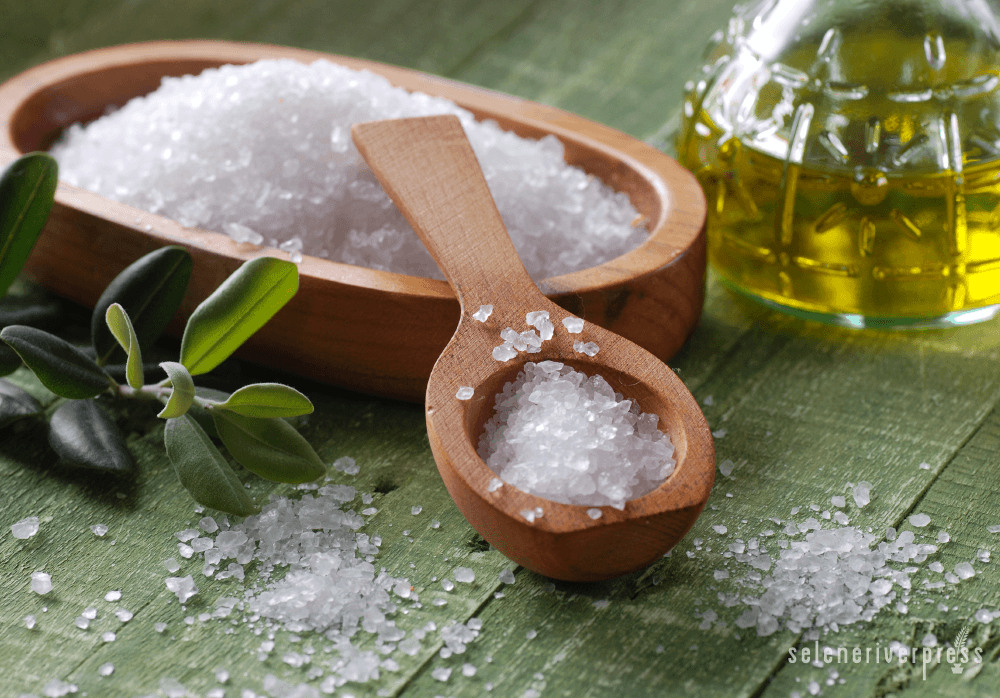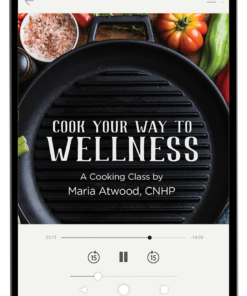Of all the spices in the world, I believe salt may be the most maligned of them all. And yet, most of us consume it on a daily basis! Salt not only plays an intricate role in satisfying our taste buds, but it’s also highly medicinal. So why am I talking about salt and salad dressings instead of salt and its medicinal benefits? Well, there’s usually some sort of personal story to most of my blog posts. In this case the story is about how salt taught me a vital lesson when I recently made my own salad dressing.
Without much thought, I decided to make a nice, fresh green salad to serve alongside my rare-cooked grass-fed steak. Yum! Since this is a meal I fix often, on this particular day I was physically present but mentally in some other space. I added my olive oil, lemon juice, and minced garlic clove to a small dish, but it fell short of my expectations upon tasting. So I threw in a bit of mustard and even a few hot pepper flakes. Again, there was a sense that something wasn’t quite right, but I excused it by thinking that not every meal is perfect. Pay attention to your taste buds!
I sat down to eat my steak and salad feast, and once I tasted the first bit of my salad, it suddenly hit me. It wasn’t my imagination—something important was, in fact, missing. The light bulb finally went on, and the word “salt” appeared in my mind. Aha! I grabbed my Celtic salt, and in an instant my taste buds felt a deep down satisfaction. This craving was different than any I could remember, like when you realize you’re extremely thirsty and you can’t drink the water down fast enough. Yep, deep inside, our psyche is endowed with the need for salt.
But why is this spice so satisfying, and even necessary, at almost every meal? After all, in the allopathic medical world we’re deprived of it at the slightest sign of high blood pressure and/or heart disease. Putting on my researcher hat, I soon found myself looking into the world of salt. Let me share my findings, alongside a few of my favorite salad dressing recipes—with salt, of course!
Key Reasons Why Salt Is Essential to Your Health
Before we talk about the importance of salt, I believe it’s essential to understand the role of potassium. That’s why I recommend reading Dr. Royal Lee’s 1951 article “The Physiology of Salt Metabolism.”
To briefly summarize, Dr. Lee notes that there’s no point talking about—or restricting—the consumption of table salt without considering the potassium level of an individual. Discussing the critical relationship between sodium and potassium in the body, Lee states:
“The present custom of restricting salt for patients with cardiovascular disease seems to be an ill-advised substitute for balancing up their potassium-sodium intake. A deficiency of potassium may be a primary cause of the very condition in which sodium is being restricted and [more dietary] potassium [may] be the real remedy needed.”
Why Does Potassium Matter?
- It aids in maintaining a regular heart beat.
- It helps prevent stroke.
- It’s important for a healthy nervous system.
- It maintains blood pressure, muscle tone, and proper muscle contraction.
- It regulates levels of acidity, the transfer of nutrients through cell membranes, and water balance.
- It’s required for carbohydrate and protein metabolism.
With this in mind, I recommend Organically Bound Minerals for the best source of potassium supplementation. It’s a very special product from Standard Process that supplies good amounts of organic potassium in an easy-to-take form.
Also, from Dr. Bruce Fife’s book Coconut Water for Health and Healing, I learned that drinking a few bottles of potassium-rich coconut water is a delicious and healthy way to maintain an adequate potassium intake while benefiting from numerous age-defying elements found in coconut water.
Finally, I want to offer 7 important excerpts from an article published by the Weston A. Price Foundation: “The Salt of the Earth,” written by Sally Fallon Morell.
- “The body’s interior ocean is salty, and without salt the myriad chemical reactions that support enzyme function, energy production, hormone production, protein transport and many other biochemical processes simply can’t work. The chemical requirements of the human body demand that the salt concentration in the blood be kept constant. If the body does not get enough salt, a hormonal mechanism compensates by reducing the excretion of salt in the urine and sweat. But it cannot reduce this output to zero. On a completely salt-less diet, the body steadily loses small amounts of salt via the kidneys and sweat glands—more if the body is engaging in vigorous physical activity. It then attempts to adjust to this loss by accelerating its secretion of water, so that the blood’s salt concentration can be maintained at the vital level. The result is a gradual desiccation of the body and finally death. The organism literally dies of thirst.”
- “Salt provides two elements that are essential for life and for good health: sodium and chloride ions. They are both elements that the body cannot manufacture itself so it must be supplied by food. Although salt is the most common dietary source for these essential elements, sodium is also available from various foods that contain sodium naturally.”
- “One of salt’s major functions is to regulate blood volume and pressure, including the flexibility of the blood vessels. Blood pressure can be affected by stress, age, exercise, heredity and diet. For certain individuals who are salt sensitive, excessive consumption of sodium can increase blood pressure, but for the majority, blood pressure is not raised by increased salt intake.”
- “Salt plays a key role in digestion. Sodium-dependent enzymes are required for carbohydrate digestion, to break down complex carbohydrates and sugars into monosaccharides such as glucose, fructose and galactose; sodium is also involved in transporting these monosaccharides across the intestinal wall.”
- “Salt is critical for development of the glial cells in the brain. Between 1984–1991, Mary Enig, PhD, served as an expert witness in several lawsuits in which Dr. Enig testified that chloride was essential for the growth of the brain and development of neurological function, and that sodium activated an enzyme needed for the formation of glial cells. This is especially important regarding baby formula.”
- “Adequate salt helps the adrenal glands to produce the hormones needed to keep the body’s metabolism running smoothly; for example, vitamin C transport into the adrenal glands is sodium-dependent, and vitamin C is an enzymatic cofactor involved in the production of a number of adrenal hormones.”
- “The use of salt by humans is intimately connected with our advance from a nomadic Stone Age life of hunting and gathering, to agriculture in which grain cereals became an important food. Salt is needed to make these foods taste good, and also to preserve meats and dairy foods for storage and transport. Increased use of salt led to increased production of glial cells in the brain, the cells that make us capable of creative thinking and long-term planning. Indeed, in ancient cultures, salt was considered the gift of the gods.”
Be sure the salt you use is sea salt. As you’ll read in Stephanie Selene Anderson’s “Eat Your Salt,” there’s a big difference between the processed food sold as iodized salt and the real thing.
Now, as promised, here’s a collection of “28 Fermented and Probiotic Salad Dressings,” compiled by one of my favorite traditional cooks, Wardee Harmon, at her website Traditional Cooking School. Recipes from Lindsey Dietz.



